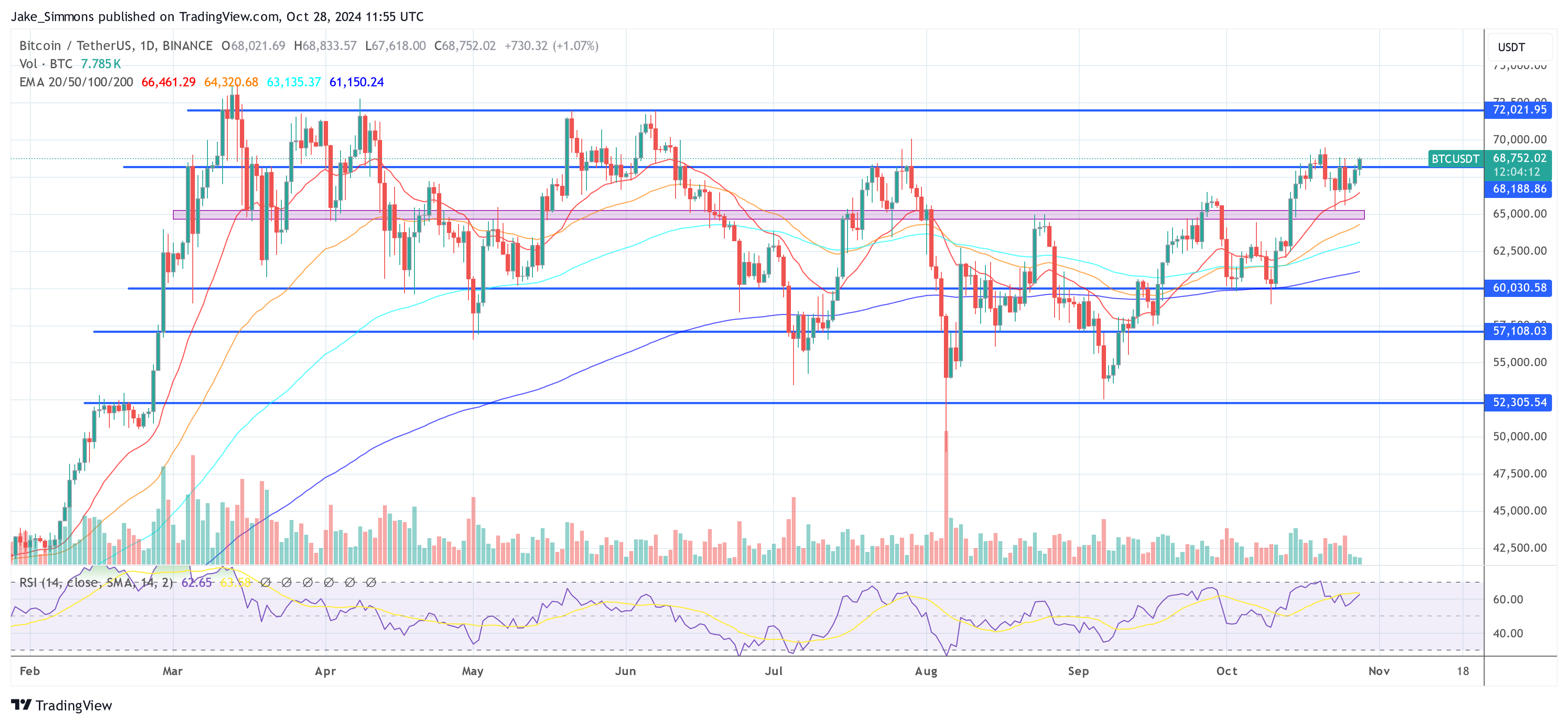In a brand new YouTube video titled “There Is No ETF Paper Bitcoin,” Fred Krueger, an investor on the crypto hedge fund 2718.fund, delved into the rising considerations surrounding US spot Bitcoin Exchange-Traded Funds (ETFs) and their affect on the cryptocurrency’s value. Krueger aimed to dispel the worry, uncertainty, and doubt (FUD) which have been circulating about “paper Bitcoin”—the notion that ETFs may be promoting Bitcoin they don’t truly possess—and to elucidate why Bitcoin’s value has not surged as dramatically as some may anticipate, regardless of important ETF purchases.
Krueger started his evaluation by acknowledging the prevalent skepticism available in the market. “There’s all this paper Bitcoin, and ETFs don’t really have the Bitcoin, and if they were buying all this Bitcoin, how come Bitcoin price is not higher?” he said, encapsulating the core considerations of many traders.
Historically, the idea of “paper Bitcoin” has been related to exchanges that bought Bitcoin to prospects with out truly possessing the underlying property. Krueger highlighted a number of high-profile situations the place this apply led to important losses for traders. He cited the case of Mt. Gox.
Another instance he supplied was QuadrigaCX, a Canadian trade that collapsed below mysterious circumstances. Founder Gerald Cotten allegedly died in India, taking with him the personal keys to the trade’s chilly wallets, successfully locking away buyer funds. “A lot of Canadians lost all their Bitcoin on this Quad exchange,” Krueger famous.
Are “ETF Paper Bitcoin” Real?
These historic occasions have contributed to the present apprehension about ETFs and the chance that they may be partaking in related practices—promoting Bitcoin they don’t truly maintain, thereby suppressing BTC’s value by means of synthetic provide. However, Krueger argued that ETFs, significantly these managed by established monetary establishments, function below a essentially completely different framework in comparison with unregulated exchanges.
Related Reading
Focusing on two main ETFs—IBIT, the BlackRock ETF, and FBTC, the Fidelity ETF—Krueger emphasised the stringent regulatory oversight governing these entities. “Both of these ETFs are subject to very strict regulatory oversight, including the SEC but also other agencies in the US,” he said. This complete oversight consists of necessities for full transparency, common audits, and the usage of third-party custodians for asset verification. “They literally have to get a receipt of an asset from a third-party custodian,” Krueger added.
In the case of IBIT, Coinbase serves because the third-party custodian. “Coinbase is itself a public company that is audited,” Krueger identified, noting that the general public nature of Coinbase provides a further layer of scrutiny and accountability. IBIT conducts audits of Coinbase, and each entities are topic to audits by the SEC and different regulatory our bodies. For FBTC, custody is dealt with by Fidelity Digital Assets, a separate entity inside Fidelity that makes a speciality of the custody of digital property, thereby guaranteeing specialised oversight and administration.
“The issuers of IBIT and FBTC are BlackRock and Fidelity, two of the largest and oldest financial institutions, and they have a vested interest in maintaining their reputation,” Krueger asserted. “Their reputation is at stake, and this is a big deal,” he emphasised, suggesting that these establishments wouldn’t threat their credibility by partaking within the sale of non-existent Bitcoin.
Krueger contrasted BlackRock with entities like QuadrigaCX to underscore the disparity in regulatory compliance and operational scale. “BlackRock is highly regulated […] BlackRock has a robust corporate governance structure with committees for audit, risk, and compliance and very extensive internal controls,” Krueger added.
Related Reading
Addressing the core concern about ETFs holding “paper Bitcoin,” Krueger supplied particular information to refute this notion. “The reality is the ETFs have zero pure paper Bitcoin,” he said unequivocally. He highlighted that IBIT holds roughly 403,000 precise Bitcoins, whereas FBTC holds about 185,000 precise Bitcoins. “Together, these two ETFs hold almost 3% of the world’s total Bitcoin, or 588,000 Bitcoins—I think it’s 2.9%,” he calculated.
Krueger acknowledged that some skeptics have tried to research Bitcoin motion between particular dates to problem these holdings. However, he emphasised that the details are clear and verifiable. “We know how much Bitcoin these ETFs have; we know that it’s accounted for, and that’s a reality,” he insisted.
Turning to the query of why Bitcoin’s value has not elevated extra dramatically regardless of important ETF inflows, Krueger supplied a nuanced clarification. He famous that Bitcoin is, in reality, up by 60% for the reason that introduction of the ETFs, translating to a $600 billion improve in market capitalization. This development has been fueled by roughly $20 billion in internet inflows into the ETFs, leading to a value multiplier impact of about 30x. “That’s historically about normal, maybe a little on the low side but not terribly so,” he assessed.
Krueger attributed the moderation in Bitcoin’s value development to substantial promoting pressures from numerous sources. “There’s been a bunch of selling,” he defined. He detailed that Germany bought $3 billion price of Bitcoin in addition to Mt. Gox holdings. Additionally, FTX bought its GBTC (Grayscale Bitcoin Trust) stake earlier within the 12 months, and the Digital Currency Group (DCG) bought property to resolve lawsuits. “We had a lot of selling,” Krueger summarized.
Speculating on the potential affect absent these promoting pressures, Krueger steered that Bitcoin’s value may have been considerably greater. “We probably would be at $90k if there wasn’t any selling,” he posited.
At press time, BTC traded at $68,752.

Featured picture created with DALL.E, chart from TradingView.com


